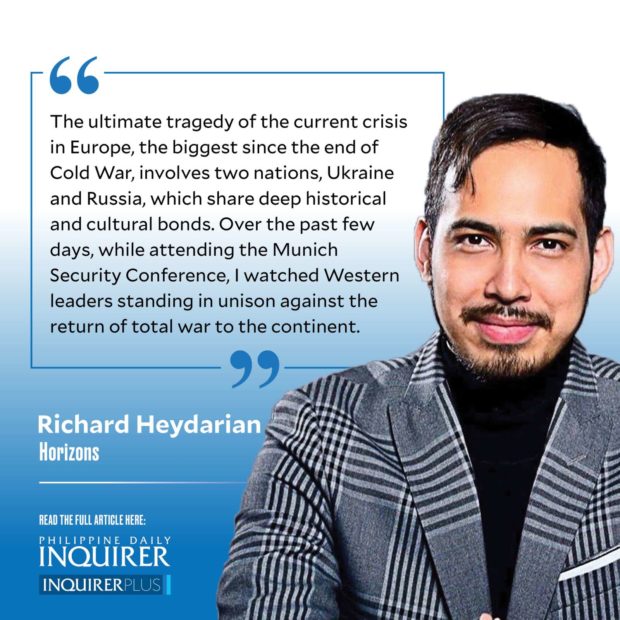Will Russia invade Ukraine?
MUNICH — In the 1930s, the anthropologist Gregory Bateson, studying tribes in New Guinea, observed a distinctly powerful phenomenon among human beings, which he described as “schismogenesis.” Derived from the Greek words “skhisma” and “genesis,” it literally means the “creation of division.”
According to Bateson, schismogenesis is “a process of differentiation in the norms of individual behavior resulting from cumulative interaction between individuals,” which can, in some cases, turn into a competitive and even destructive dynamic. As a result, geographically-proximate and culturally-similar peoples can turn into fierce competitors, if not adversaries.
Article continues after this advertisementA decade earlier, the Austrian psychoanalyst Sigmund Freud made similar observations in “Civilization and Its Discontents” (1929–1930), where he lamented the destructive “narcissism of small differences.” The First World War started among monarchic cousins from Germany, Britain, and Russia.
The ultimate tragedy of the current crisis in Europe, the biggest since the end of Cold War, involves two nations, Ukraine and Russia, which share deep historical and cultural bonds. Over the past few days, while attending the Munich Security Conference, I watched Western leaders standing in unison against the return of total war to the continent.
In her keynote speech here in Munich, the US Vice-President Kamala Harris warned of “swift” and “severe” response, while British Prime Minister Boris Johnson made it clear that “our collective interest that Russia should ultimately fail and be seen to fail” if it decides to press ahead with an invasion of a sovereign nation.
Article continues after this advertisementIn a press conference, US President Joseph Biden confidently claimed, “[a]s of this moment, I am convinced he’s made the decision,” referring to his Russian counterpart, Vladimir Putin. The US leader has asserted, as in the previous week, that an all-out invasion, including the Ukrainian capital of Kiev, is imminent, likely “in the coming week,” if not sooner.
But the Kremlin has repeatedly rejected such claims, instead insisting on negotiating a new order in Europe, which acknowledges Moscow’s spheres of influence. For Putin, who was reportedly stationed in Europe during the Fall of the Berlin Wall in 1989, “the demise of the Soviet Union was the greatest geopolitical catastrophe of the century.”
During a speech last year, he lamented “the collapse of historical Russia,” which marked “a tragedy as for the vast majority of the country’s citizens,” referring to the economic crises and geopolitical humiliation that came in the wake of the Soviet Union’s collapse.
After two decades in power, Putin has managed to rebuild Russia’s armed forces and reassert the country’s influence across much of the post-Soviet space, from Kazakhstan and Armenia to Belarus and the easternmost parts of Ukraine. In 2008 and 2014, Russia flexed its military muscle vis-à-vis Western-leaning regimes in Georgia and Ukraine, culminating in the “return” of Crimea to Moscow.
What has particularly worried the West is the perception that the current Russian leadership is effectively denying the existence of Ukraine as an independent nation. In the words of Harvard historian Serhii Plokhy, Putin’s new model of nation-building “has switched its focus to the idea of forming a single Russian nation … unifying the Eastern Slavs on the basis of the Russian language and culture.”
But the threat of a Russian invasion, and pro-Russian rebellions in places such as Donetsk, has also galvanized nationalist sentiments in Kiev, which has refused to surrender its constitutional commitment to join the North Atlantic Treaty Organization. Nor are the Western leaders in a position to accept Russian demands for categorically rejecting any Ukrainian attempt to join their military alliance.
The upshot is a perilous deadlock, whereby no side can back down without losing face. For some observers, this has left lots of room for hardliners to seize the initiative. Moscow-based analysts such as Konstantin Remchukov and Alexander Gabuev have discussed the role of Russian hawks such as Sergei K. Shoigu, Nikolai Patrushev, and Sergei Naryshkin in forming a new “ideology” in Moscow at the expense of technocratic-pragmatists such as Prime Minister Mikhail Mishustin.
But as a top Russian expert lamented, an actual war would be a lose-lose situation for all sides: “Even if the Russian army managed to force Kyiv into a swift and humiliating defeat without too many casualties, the damage to Russia’s national interests would surely outweigh any potential military gains.” Sadly, human nature can also defy reason.
rheydarian@inquirer.com.ph
RELATED OPINION

















